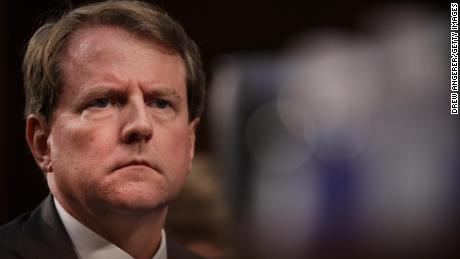
Washington – A federal judge decided Monday that President Donald Trump’s former White House counsel Don McGahn must testify to the House of Representatives in its impeachment probe.
“However busy or essential a presidential aide might be, and whatever their proximity to sensitive domestic and national-security projects, the President does not have the power to excuse him or her from taking an action that the law requires,” Judge Ketanji Brown Jackson wrote.
“Stated simply, the primary takeaway from the past 250 years of recorded American history is that Presidents are not kings,” Jackson said.
The ruling is a blow to Trump and White House efforts to block parts of the impeachment inquiry. It could encourage resistant witnesses from the administration to testify and could bolster any case House Democrats make to impeach the President for obstructing its proceedings or obstructing justice.
The Justice Department plans to appeal the ruling in the McGahn case, a department spokeswoman said. An attorney for McGahn said the former White House counsel would testify, unless the case is paused for appeals.
“Don McGahn will comply with Judge Jackson’s decision unless it is stayed pending appeal,” McGahn’s private attorney, William Burck, said Monday following the ruling.
In this case, McGahn is represented by the Justice Department.
The House Judiciary Committee has been trying to force McGahn to testify since April about the President’s attempts to obstruct the investigation into Russian meddling in the 2016 US presidential election. The committee says it still has an urgent need to hear from the key witnesses from special counsel Robert Mueller’s investigation.
Brown criticized the Justice Department’s broad claims of immunity.
“To make the point as plain as possible … with respect to senior-level presidential aides, absolute immunity from compelled congressional process simply does not exist,” Jackson wrote.
“Indeed,” she added, “absolute testimonial immunity for senior-level White House aides appears to be a fiction that has been fastidiously maintained over time through the force of sheer repetition in (Office of Legal Counsel) opinions, and through accommodations that have permitted its proponents to avoid having the proposition tested in the crucible of litigation.”
Executive privilege
The ruling stops short of saying White House officials must answer all questions they’re asked before Congress. Instead, the ruling focuses on whether an official like McGahn must appear for testimony once subpoenaed.
“If a duly authorized committee of Congress issues a valid legislative subpoena to a current or former senior-level presidential aide, the law requires the aide to appear as directed, and assert executive privilege as appropriate,” the judge wrote in the 120-page opinion Monday.
If McGahn were to appear for testimony, he still may be able to refuse to answer questions, citing executive privilege. She referred to a case involving President George W. Bush’s White House counsel Harriet Miers.
“Accordingly, just as with Harriet Miers before him, Donald McGahn ‘must appear before the Committee to provide testimony, and invoke executive privilege where appropriate,'” Jackson wrote.
Jackson notes in her opinion Monday that even the President himself may not be immune from testimony.
“Even with respect to the underlying contention that the President himself is entitled to absolute testimonial immunity, Miers found binding Supreme Court cases that compelled the opposite conclusion,” Jackson wrote.
As reported by CNN
